1. About ECOLink Project:
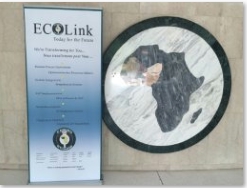 ECOLink Project was initiated Mid 2014 with the main purpose of transforming and
improving key operations within the ECOWAS Community.
A very important aspect of ECOLink project is SAP Public Sector
Information System implementation and associated business and organizational
changes.
It is important to underline that, ECOLink Project is aligned with
objectives of the Institutional Reform initiative and by its nature and
purpose, is realizing ECOWAS’ strategic goals of improving efficiency and
quality of internal operations.
ECOLink Project was initiated Mid 2014 with the main purpose of transforming and
improving key operations within the ECOWAS Community.
A very important aspect of ECOLink project is SAP Public Sector
Information System implementation and associated business and organizational
changes.
It is important to underline that, ECOLink Project is aligned with
objectives of the Institutional Reform initiative and by its nature and
purpose, is realizing ECOWAS’ strategic goals of improving efficiency and
quality of internal operations. |
ECOLink Goals and Objectives:
- Streamlining time-consuming business processes
- Improve control over documents and document-oriented processes
- Reduction of paper handling and manual processes
- Faster access on information
- Online access to information that was formerly available only on paper
or other physical media
- Improve tracking and monitoring, enabling identification and reduction
of bottlenecks
- Reduction of paper storage and elimination of lost documents
- Integrated applications that access standardized enterprise data for all
ECOWAS Institutions, Agencies and Offices
|
2. Scope & Timeline
The scope of the project is divided into two waves which ensures decent quality
of ECOLink implementation
Wave I <Q1 2015>
- Accounting and General Ledger
- Budgeting
- Funds Management
- Grant Management
- Cash Management
- Payments and Accounts Payable
- Revenue Receipting and Accounts Receivable
- Fixed Asset Accounting
- Material Management
- Procurement & Stock Management
|
 |
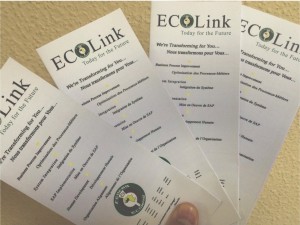 |
Wave II <Q3 2015>
- Employee Self-Service & Manager Self-Service Portal
- Human Capital Management
- Payroll Accounting
- Pension Management
- Travel Management
|
 |
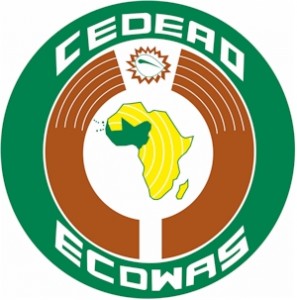 |
|
|
3. Beneficiaries:
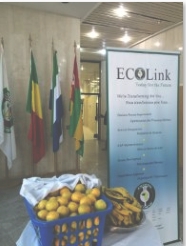 ECOLink Project is expected to be implemented in all ECOWAS Institutions, Agencies, Offices and Zonal Bureaus.
ECOWAS Commission has been selected as a Pilot for entire implementation which will be launched end of February 2015.
Implementation for Court of Justice, Parliament, WAHO, GIABA and other Agencies and Offices shall be launched in a staggered manner starting from Mid February until Mid May 2015.
Contrary to the first impression, the entire ECOWAS Commission, including all Directorates and Units will benefit from the successful implementation of the ECOLink Project.
Although Wave 1 implementation focuses on finance and procurement functions, it
is important to underline that apart from the Finance and Procurement Units, all
the Program and Project Management Units will benefit from ECOLink, by having
very quick access to financial and procurement information related to any
program. Consequently, it will provide ability to monitor and control all the
financials of particular activities.
In other words, all Directorates and Units using the service functions of
Finance and Procurement, will benefit indirectly from ECOLink Project, with
improved efficiency and quality of those services
ECOLink Project is expected to be implemented in all ECOWAS Institutions, Agencies, Offices and Zonal Bureaus.
ECOWAS Commission has been selected as a Pilot for entire implementation which will be launched end of February 2015.
Implementation for Court of Justice, Parliament, WAHO, GIABA and other Agencies and Offices shall be launched in a staggered manner starting from Mid February until Mid May 2015.
Contrary to the first impression, the entire ECOWAS Commission, including all Directorates and Units will benefit from the successful implementation of the ECOLink Project.
Although Wave 1 implementation focuses on finance and procurement functions, it
is important to underline that apart from the Finance and Procurement Units, all
the Program and Project Management Units will benefit from ECOLink, by having
very quick access to financial and procurement information related to any
program. Consequently, it will provide ability to monitor and control all the
financials of particular activities.
In other words, all Directorates and Units using the service functions of
Finance and Procurement, will benefit indirectly from ECOLink Project, with
improved efficiency and quality of those services |
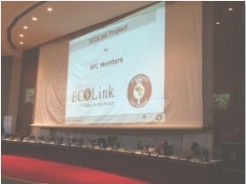 ECOLink Wave 2 is providing extensive and professional improvement of HR functions and Travel Management. That is another wave where all ECOWAS employees will benefit from this initiative, for example by having quick and easy access
to their own personal data (e.g. Leave days due, utilised ones, outstanding, online Leave Requests, salary status etc.) and everything else with the click of a button.In summary, all ECOWAS staff are beneficiaries of ECOLink Project and we all
are responsible for its success. ECOLink Wave 2 is providing extensive and professional improvement of HR functions and Travel Management. That is another wave where all ECOWAS employees will benefit from this initiative, for example by having quick and easy access
to their own personal data (e.g. Leave days due, utilised ones, outstanding, online Leave Requests, salary status etc.) and everything else with the click of a button.In summary, all ECOWAS staff are beneficiaries of ECOLink Project and we all
are responsible for its success. |
4. Project Team
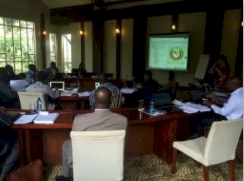 The most critical factor of every project and initiative is the human aspect. ECOWAS has made significant efforts to mobilize required skilled resources for the ECOLink Core Team Project Members. ECOLink Project Core Team is made up of 51 experts.
Consequently, ECOLink is a build-up of the Core Resource persons in Finance, Procurement, HR and Travel Management, led by a Project Manager, Mr. Richard Awunyo, supported by the Project Management Office, a Supervising Consultant and a Change Management Consultant.
ECOLink initiative is supervised by the Project Sponsor, Mrs.Khadi R. Saccoh, Commissioner for Finance
with the full support of the President and Vice President of the ECOWAS
Commission.
The most critical factor of every project and initiative is the human aspect. ECOWAS has made significant efforts to mobilize required skilled resources for the ECOLink Core Team Project Members. ECOLink Project Core Team is made up of 51 experts.
Consequently, ECOLink is a build-up of the Core Resource persons in Finance, Procurement, HR and Travel Management, led by a Project Manager, Mr. Richard Awunyo, supported by the Project Management Office, a Supervising Consultant and a Change Management Consultant.
ECOLink initiative is supervised by the Project Sponsor, Mrs.Khadi R. Saccoh, Commissioner for Finance
with the full support of the President and Vice President of the ECOWAS
Commission. |
| “Every second of every new minute in every new day-time marches on. In order for a new day to come, the old one must pass; In order to welcome the freshness of the morning, the darkness of the night must pass; the two cannot exist at the same time. One must go for the other to come.
Time marches on, and we have no choice but to march on with it. If your route is blocked the first time, do not go back. Try every other route until you find the one that leads you onto success.” |
|
5. Change Management
Objective of the Change Management activities are to minimize
uncertainty and disruption to ECOWAS through predicting and managing the
organization and people related factors likely to be associated with the
ECOLink Project. This will be achieved, primarily, through planned interventions
that build organizational capability and capacity for change, while also
reducing resistance.Change Management Framework focuses on the following aspects:
- Change Readiness Assessment
- Stakeholder Analysis
- Change
Impact Analysis
- Communication
- Stakeholder Analysis & Engagement
- Go-live
Readiness Assurance
- Knowledge
transfer management
|
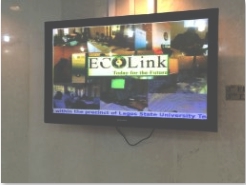
 |
|
| With professional expertise and support, the ECOLink Change Management activities
will be handled through out the whole project duration to ensure successful
transformation. |
6. Current status
After successful completion of the Project Preparation, Blueprint and Realization phases, ECOLink Project entered a Final Preparation phase.
All End Users being impacted by Wave I (Finance, Controlling, Fund Management, Grant Management, Procurement and Inventory Management) have been successfully trained. Currently, after successful Go-Live in ECOWAS Commission on 23rd February 2015, the entire organization is conducting a final Readiness Check in other ECOWAS Institutions, to be able to Go-Live on 9th March 2015 in ECOWAS Court of Justice, 18th March 2015 in ECOWAS Parliament, 10th April 2015 in WAHO and 24th April 2015 in GIABA.
As an organization undergoing transition, it is important for our suppliers and Contractors to be aware about possible inconveniences (although limited) in terms of processing some financial and procurement transactions within ECOWAS. It is important to note that the transition phase in ECOWAS is professionally managed, thereby minimizing the occurrence of prolonged delay. However, it is our responsibility, as a reliable partner, to inform you beforehand, should there be temporary inconveniences, and would appreciate your understanding in this regard. |

 ECOLink Project was initiated Mid 2014 with the main purpose of transforming and
improving key operations within the ECOWAS Community.
A very important aspect of ECOLink project is SAP Public Sector
Information System implementation and associated business and organizational
changes.
It is important to underline that, ECOLink Project is aligned with
objectives of the Institutional Reform initiative and by its nature and
purpose, is realizing ECOWAS’ strategic goals of improving efficiency and
quality of internal operations.
ECOLink Project was initiated Mid 2014 with the main purpose of transforming and
improving key operations within the ECOWAS Community.
A very important aspect of ECOLink project is SAP Public Sector
Information System implementation and associated business and organizational
changes.
It is important to underline that, ECOLink Project is aligned with
objectives of the Institutional Reform initiative and by its nature and
purpose, is realizing ECOWAS’ strategic goals of improving efficiency and
quality of internal operations. ECOLink Project is expected to be implemented in all ECOWAS Institutions, Agencies, Offices and Zonal Bureaus.
ECOWAS Commission has been selected as a Pilot for entire implementation which will be launched end of February 2015.
Implementation for Court of Justice, Parliament, WAHO, GIABA and other Agencies and Offices shall be launched in a staggered manner starting from Mid February until Mid May 2015.
Contrary to the first impression, the entire ECOWAS Commission, including all Directorates and Units will benefit from the successful implementation of the ECOLink Project.
Although Wave 1 implementation focuses on finance and procurement functions, it
is important to underline that apart from the Finance and Procurement Units, all
the Program and Project Management Units will benefit from ECOLink, by having
very quick access to financial and procurement information related to any
program. Consequently, it will provide ability to monitor and control all the
financials of particular activities.
In other words, all Directorates and Units using the service functions of
Finance and Procurement, will benefit indirectly from ECOLink Project, with
improved efficiency and quality of those services
ECOLink Project is expected to be implemented in all ECOWAS Institutions, Agencies, Offices and Zonal Bureaus.
ECOWAS Commission has been selected as a Pilot for entire implementation which will be launched end of February 2015.
Implementation for Court of Justice, Parliament, WAHO, GIABA and other Agencies and Offices shall be launched in a staggered manner starting from Mid February until Mid May 2015.
Contrary to the first impression, the entire ECOWAS Commission, including all Directorates and Units will benefit from the successful implementation of the ECOLink Project.
Although Wave 1 implementation focuses on finance and procurement functions, it
is important to underline that apart from the Finance and Procurement Units, all
the Program and Project Management Units will benefit from ECOLink, by having
very quick access to financial and procurement information related to any
program. Consequently, it will provide ability to monitor and control all the
financials of particular activities.
In other words, all Directorates and Units using the service functions of
Finance and Procurement, will benefit indirectly from ECOLink Project, with
improved efficiency and quality of those services ECOLink Wave 2 is providing extensive and professional improvement of HR functions and Travel Management. That is another wave where all ECOWAS employees will benefit from this initiative, for example by having quick and easy access
to their own personal data (e.g. Leave days due, utilised ones, outstanding, online Leave Requests, salary status etc.) and everything else with the click of a button.In summary, all ECOWAS staff are beneficiaries of ECOLink Project and we all
are responsible for its success.
ECOLink Wave 2 is providing extensive and professional improvement of HR functions and Travel Management. That is another wave where all ECOWAS employees will benefit from this initiative, for example by having quick and easy access
to their own personal data (e.g. Leave days due, utilised ones, outstanding, online Leave Requests, salary status etc.) and everything else with the click of a button.In summary, all ECOWAS staff are beneficiaries of ECOLink Project and we all
are responsible for its success. The most critical factor of every project and initiative is the human aspect. ECOWAS has made significant efforts to mobilize required skilled resources for the ECOLink Core Team Project Members. ECOLink Project Core Team is made up of 51 experts.
Consequently, ECOLink is a build-up of the Core Resource persons in Finance, Procurement, HR and Travel Management, led by a Project Manager, Mr. Richard Awunyo, supported by the Project Management Office, a Supervising Consultant and a Change Management Consultant.
ECOLink initiative is supervised by the Project Sponsor, Mrs.Khadi R. Saccoh, Commissioner for Finance
with the full support of the President and Vice President of the ECOWAS
Commission.
The most critical factor of every project and initiative is the human aspect. ECOWAS has made significant efforts to mobilize required skilled resources for the ECOLink Core Team Project Members. ECOLink Project Core Team is made up of 51 experts.
Consequently, ECOLink is a build-up of the Core Resource persons in Finance, Procurement, HR and Travel Management, led by a Project Manager, Mr. Richard Awunyo, supported by the Project Management Office, a Supervising Consultant and a Change Management Consultant.
ECOLink initiative is supervised by the Project Sponsor, Mrs.Khadi R. Saccoh, Commissioner for Finance
with the full support of the President and Vice President of the ECOWAS
Commission.







